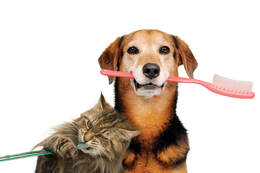 Did you know that during the month of February, veterinary professionals actively promote awareness around dental health in dogs and cats, and often offer awesome discounts on dental care and dental products? It's true! Dental health is incredibly important to your pet's overall health and wellness. Dental disease causes more than just bad breath - it is painful, shortens the life of dogs and cats, and reduces their quality of life. When a pet develops periodontal disease, they have infection and inflammation in their gums. Bacteria from the mouth can then enter the bloodstream and land in the heart or kidneys, putting extra wear and tear on these organs, shortening the life of the pet. Dogs and cats can start developing dental disease as soon as they get their adult teeth - around 6 months of age. In fact, over 70% of pets over the age of two are suffering from some level of dental disease. Just like people, dogs and cats get plaque buildup on their teeth. Plaque can be scraped or wiped off, but if it sits on a tooth for longer than 72 hours it can harden into tartar, which requires professional equipment to remove! Fortunately, there are several things you can do help promote dental health in your pet:
It can be hard to choose dental products that actually do what they claim to do on the label. Here is a few of my favorite dental products that you can purchase for your pet! Frequently Asked Questions about Pet Dental Health: How often do I need to brush my pet's teeth? Pets accumulate dental plaque just like humans do, so ideally you should brush your pet's teeth daily. It helps to set up a habit so you remember, such as, every time I brush my teeth, I brush my pet's teeth. If you can't brush every day, try to brush every 3 days because it takes that long for plaque (which can be removed with a brush) to harden into tartar (which can't). Do I have brush the inside of my pet's teeth? They won't say 'AH!" Fortunately, pets don't seem to accumulate much plaque on the inner surfaces of their teeth (the tooth surfaces that are closest to the tongue). You can give your pet the benefit of brushing just the outsides of the teeth - play close attention to the big teeth in the back and the canine teeth where pets seem to accumulate the most plaque, and don't forget the bottom jaw! I'm brushing my pet's teeth but they are stained brown and don't seem to get cleaner. What am I doing wrong? You aren't doing anything wrong - the brown staining is most likely dental tartar that is hard, adhered to the tooth and can't be removed with brushing alone. If this is the case, your best choice is to schedule a dental cleaning for your pet so that you can start fresh with clean teeth! Do dental chews help clean a dog's teeth? Chewing safe, long-lasting chews can definitely help to scrape teeth clean. And chewing is good for your dog's mental and emotional health as well! What science has found is that it isn't necessarily the type of chew but how long the dog chews for - chews that last 10-2 minutes are more effective than chews that last less than 10 minutes. Why are veterinary dental cleanings so expensive? They cost more than my dental cleanings! Pets don't understand that we are trying to help them when we clean their teeth - we can't ask them to say 'AH!' and if we tried to clean their teeth while they were awake, it would be incredibly stressful for them and we would not be able to clean below the gumline, where most dental disease likes to hide. Therefore, we have to anesthetize animals when we clean their teeth, and anesthesia is very costly. Most dental cleanings will cost $800-$1000 and more if there is any dental disease that requires extractions. To budget for yearly dental cleanings, I recommend saving $100 a month, or investing in pet insurance or a veterinary wellness plan that includes dentistry. How does dental disease affect my pet's overall health? If your pet has periodontal disease (gum disease), then that means your pet has inflammation in their mouth. Periodontal disease increases the body's burden of inflammation, and chronic inflammation is a key contributor to many health problems. Furthermore, bacteria gets into the bloodstream from infected gums and showers the valves of the heart and the kidneys, increasing wear and tear on these organs, shortening a pet's life space. Lastly, dental disease is chronically painful.
0 Comments
Your comment will be posted after it is approved.
Leave a Reply. |
AuthorDr. Sarah Wooten is a well known international influencer in the veterinary and animal health care spaces. She has 16 years experience in private practice and over 10 years experience in veterinary media work, and is a certified veterinary journalist. Archives
October 2023
Categories |
The information provided by Sarah J. Wooten, DVM, Inc. (https://www.drsarahwooten.com/ (the our mobile application our mobile application our mobile application THE SITE OR OUR MOBILE APPLICATION THE SITE AND OUR MOBILE APPLICATION THE SITE AND OUR MOBILE APPLICATION THE SITE AND OUR MOBILE APPLICATION
AFFILIATES DISCLAIMER
Clickbank
ShareASale
We are a participant in the Amazon Services LLC Associates Program, an affiliate advertising program designed to provide a means for us to earn advertising fees by linking to Amazon.com and affiliated websites.
TESTIMONIALS DISCLAIMER
The Site may contain testimonials by users of our products and/or services. These testimonials reflect the real-life experiences and opinions of such users. However, the experiences are personal to those particular users, and may not necessarily be representative of all users of our products and/or services. We do not claim, and you should not assume, that all users will have the same experiences. YOUR INDIVIDUAL RESULTS MAY VARY.
The testimonials on the Site are submitted in various forms such as text, audio and/or video, and are reviewed by us before being posted. They appear on the Site verbatim as given by the users, except for the correction of grammar or typing errors. Some testimonials may have been shortened for the sake of brevity where the full testimonial contained extraneous information not relevant to the general public.
The views and opinions contained in the testimonials belong solely to the individual user and do not reflect our views and opinions. We are not affiliated with users who provide testimonials, and users are not paid or otherwise compensated for their testimonials.
The testimonials on the Site are not intended, nor should
they be construed, as claims that our products and/or services can be used to
diagnose, treat, mitigate, cure, prevent, or otherwise be used for any disease
or medical condition. No testimonials have been clinically proven or evaluated.
This disclaimer was created using Termly's Disclaimer Generator.

 RSS Feed
RSS Feed